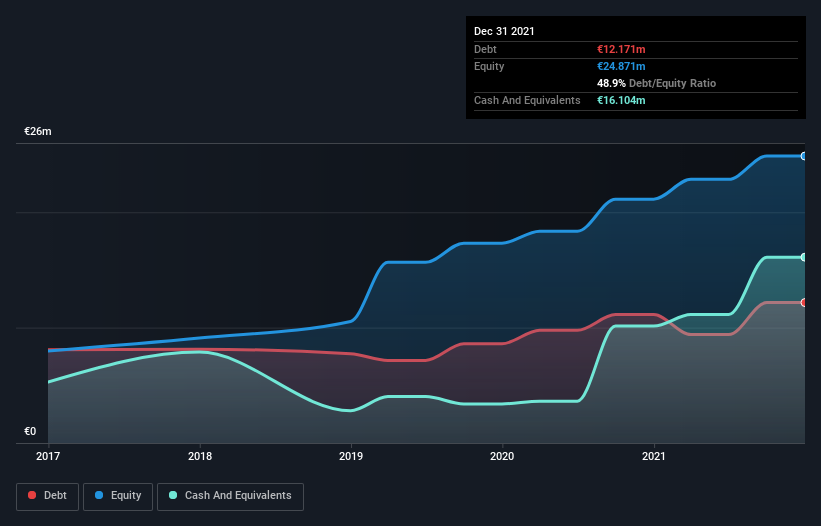
David Iben put it well when he said, 'Volatility is not a risk we care about. What we care about is avoiding the permanent loss of capital.' So it seems the smart money knows that debt - which is usually involved in bankruptcies - is a very important factor, when you assess how risky a company is. We can see that ILPRA S.p.A. (BIT:ILP) does use debt in its business. But should shareholders be worried about its use of debt?
Why Does Debt Bring Risk?
Debt and other liabilities become risky for a business when it cannot easily fulfill those obligations, either with free cash flow or by raising capital at an attractive price. In the worst case scenario, a company can go bankrupt if it cannot pay its creditors. However, a more common (but still painful) scenario is that it has to raise new equity capital at a low price, thus permanently diluting shareholders. By replacing dilution, though, debt can be an extremely good tool for businesses that need capital to invest in growth at high rates of return. The first thing to do when considering how much debt a business uses is to look at its cash and debt together.
See our latest analysis for ILPRA
What Is ILPRA's Net Debt?
The image below, which you can click on for greater detail, shows that at December 2021 ILPRA had debt of €12.2m, up from €11.1m in one year. However, it does have €16.1m in cash offsetting this, leading to net cash of €3.93m.

How Strong Is ILPRA's Balance Sheet?
According to the last reported balance sheet, ILPRA had liabilities of €18.9m due within 12 months, and liabilities of €12.9m due beyond 12 months. Offsetting this, it had €16.1m in cash and €14.9m in receivables that were due within 12 months. So its liabilities total €791.8k more than the combination of its cash and short-term receivables.
Having regard to ILPRA's size, it seems that its liquid assets are well balanced with its total liabilities. So it's very unlikely that the €44.2m company is short on cash, but still worth keeping an eye on the balance sheet. Despite its noteworthy liabilities, ILPRA boasts net cash, so it's fair to say it does not have a heavy debt load!
On top of that, ILPRA grew its EBIT by 57% over the last twelve months, and that growth will make it easier to handle its debt. The balance sheet is clearly the area to focus on when you are analysing debt. But it is future earnings, more than anything, that will determine ILPRA's ability to maintain a healthy balance sheet going forward. So if you're focused on the future you can check out this free report showing analyst profit forecasts.
Finally, while the tax-man may adore accounting profits, lenders only accept cold hard cash. While ILPRA has net cash on its balance sheet, it's still worth taking a look at its ability to convert earnings before interest and tax (EBIT) to free cash flow, to help us understand how quickly it is building (or eroding) that cash balance. In the last three years, ILPRA's free cash flow amounted to 40% of its EBIT, less than we'd expect. That weak cash conversion makes it more difficult to handle indebtedness.
Summing up
We could understand if investors are concerned about ILPRA's liabilities, but we can be reassured by the fact it has has net cash of €3.93m. And we liked the look of last year's 57% year-on-year EBIT growth. So is ILPRA's debt a risk? It doesn't seem so to us. There's no doubt that we learn most about debt from the balance sheet. However, not all investment risk resides within the balance sheet - far from it. For instance, we've identified 2 warning signs for ILPRA that you should be aware of.
If you're interested in investing in businesses that can grow profits without the burden of debt, then check out this free list of growing businesses that have net cash on the balance sheet.
New: AI Stock Screener & Alerts
Our new AI Stock Screener scans the market every day to uncover opportunities.
• Dividend Powerhouses (3%+ Yield)
• Undervalued Small Caps with Insider Buying
• High growth Tech and AI Companies
Or build your own from over 50 metrics.
Have feedback on this article? Concerned about the content? Get in touch with us directly. Alternatively, email editorial-team (at) simplywallst.com.
This article by Simply Wall St is general in nature. We provide commentary based on historical data and analyst forecasts only using an unbiased methodology and our articles are not intended to be financial advice. It does not constitute a recommendation to buy or sell any stock, and does not take account of your objectives, or your financial situation. We aim to bring you long-term focused analysis driven by fundamental data. Note that our analysis may not factor in the latest price-sensitive company announcements or qualitative material. Simply Wall St has no position in any stocks mentioned.
About BIT:ILP
Very undervalued with high growth potential.
Market Insights
Community Narratives



